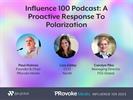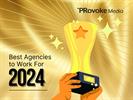Paul Holmes 07 Mar 1993 // 12:00AM GMT
Four years ago, as the panic over alar-treated apples began to wane, the first serious questions began to surface. What was the level of collusion between the media and consumer activist groups? Were these groups being allowed to get away with tactics—unscientific data, exaggerated claims, vicious invective—that would have resulted in severe criticism had they been employed by corporate public relations people? Under the circumstances, could business expect to get a fair hearing in the media?
The same questions have been rekindled this year by a series of media reports that have been pretty tough on business. First there was the story on ABC's PrimeTime Live that Food Lion routinely changed the sell-by date on old produce. Food Lion claimed the report was a fabrication by disgruntled employees and the reporters involved. Then, the cellular telephone industry came under fire after a lawsuit was filed claiming a link between cellular phones and brain cancer. The industry says it was presumed guilty despite the absence of any legitimate scientific evidence. And finally, there was NBC's Dateline, and the rigging of a crash test to try to demonstrate the deadly defects of General Motors pick-up trucks.
This time, the company involved did not simply complain about the tactics of the media and the activist group involved, the Center for Auto Safety. This time, the company did something about it. It sued. And it won. NBC backed down swiftly.
Heads rolled. The media—and in particular the electronic media—subjected itself to a massive bout of self-analysis... and found that the Dateline incident, while deplorable, was not typical.
Public relations professionals, meanwhile, seemed to view the Dateline story not as an isolated incident, but rather as a case where, like the Rodney King beating, something that occurs as a matter of routine just happened to, get captured on video this time, there for all to see. Once corporate PR executive commented in the wake of the case that he did not care whether GM was guilty or not, he considered the company's action in fighting back against the media-activist axis "heroic."
Clearly there is a growing feeling within the business community that it is difficult for corporate America to defend itself in the media, that the pronouncements of activist organizations are not subject to the same degree of scrutiny by reporters as those of corporations, and that the intensity of competition in television news in particular fuels a search for sensation which means allegations of wrong-doing are assumed to be true no matter how vehemently a company may deny them.
Al Geduldig, president of New York consulting firm Geduldig Communications Management, goes so far as to suggest that a new alliance has taken the place of the old military-industrial complex in its pervasive hold on the American thought-process, an alliance between the media, the activists, lawyers and politicians.
Says Geduldig: "All of these groups now rely on each other for sustenance. The lawyers finance the activists, who fire up the media, which relies on the activists for a new scare of the week. The media story then galvanizes the politicians, and drives more people to the lawyers. The politicians then debate the issue, creating new news, legitimizing the activists and driving even more people to the lawyers, while making sure they are portrayed as defenders of the consumer, winning the praise of the media and the activists.
"From a corporate perspective, it's hard to know how to deal with that. Everyone involved is motivated by selfinterest, but they control the information flow to such an extent it is difficult for business to get a decent hearing, unless it can do something to create its own sensation, its own scare story, which is basically what General Motors."
The relationship between consumer activist groups and the trial lawyers is one that many in the business world find particularly disturbing. Often, public relations professionals say, the media treats the claims of consumer activist groups as though they were motivated entirely by the desire to make the world a better place, rather than by the financial self-interest that is assumed to permeate all corporate pronouncements. In fact, many consumer activist groups are funded by and generate business for plaintiffs’ attorneys.
"We are what supports Ralph Nader," a Pensacola attorney told Forbes in 1990. "We contribute to him, and he fundraisers through us." A colleague from San Antonio added: "We support him overtly, covertly, in every way possible. We give him a huge percentage of what he raises." (Nader says that over 30 years, not one per cent of the funds raised by his organizations have come from the legal profession.)
The trade off, according to Forbes, is that Nader can create "a devastating bombardment of unfavorable publicity" for companies that are accused of wrong-doing, publicity that can wreak havoc with a defendant's business and force it to settle out of court, while for Nader, successful lawsuits are "just another way of imposing his policy prescriptions."
Forbes cites the attack on Audi for "sudden acceleration." The attack was conducted on two fronts, by Nader in the media and the plaintiff attorneys in the court, and devastated Audi's business in the U.S., despite a later finding by government investigators that exonerated the company.
Ron Rogers, president of Los Angeles crisis management specialist Rogers & Associates, ran up against a similar problem when defending Suzuki's Samurai trucks against charges leveled by Consumer Reports that they were prone to rolling over when cornering at high speeds.
"Consumer Reports is one of the most respected publications in the country, and everyone believes it's so totally objective," says Rogers. "But you don't have to dig very deep to find that the lawyers are the ones who support these organizations, and they have a vested interest, they have an axe to grind."
Many public relations practitioners see hypocrisy in action. The same consumer groups that attack the coalitions built by corporate interests as "fronts"—the Coalition for Vehicle Choice, for example, which is an auto-maker funded group against smaller cars—are themselves "fronts" for the financial interests of the plaintiffs' attorneys.
As for the relationship between the activists and the media, one recent book, Lee W. Baker's The Credibility Factor: Putting Ethics to Work in Public Relations, discusses this subject extensively, examining the role of the Natural Resources Defense Council, 60 Minutes, and NRDC's public relations firm, Fenton Communications of Washington, D.C., in the propagation of the alar scare.
Says Baker: "David Fenton... head of the company, said a `sea change in public opinion' took place because of the campaign. What he might well have said is, `Damn the ethics; full speed ahead.'
"The public reaction, which might better be described as near hysteria, was touched off by a 60 Minutes program on February 26, 1989. NRDC had several months before given 60 Minutes an exclusive for release of a report, Intolerable Risk: Pesticides in Our Children's Food. CBS titled its presentation A is for Apple. Shown on the television screen with the words were a skull and crossbones over a bright red apple. Ed Bradley opened the segment for his audience of 50 million viewers with these words:
"`The most potent cancer causing agent in our food supply is a substance sprayed on apples to keep them on our trees longer and make them look better. That's the conclusion of a number of scientific experts. And who is most at risk? Children, who may someday develop cancer from this one chemical called daminozide."'
Following the telecast, 70 journalists and 12 camera crews showed up for a news conference releasing of the report. "Scientists and scientific groups detected flaws in the NRDC report," says Baker. "There was a question of whether there had been peer review for the NRDC report, although the NRDC insisted that the report was indeed reviewed by what it called a blue-ribbon panel."
The weight of the scientific community soon came down against the NRDC's claims. Bruce Ames, chairman of the department of biochemistry at the University of California, produced a comparative index of possible cancer hazards that claimed products from peanut butter to Diet Coke posed risks hundreds of times higher than those associated with apples. The director of the California Department of Health Service said schools that removed apples from their menus were running from a "toxic bogeyman." The U.S. government recommended schools continue serving apples.
"Blame for unethical conduct in this case must be laid at the door of the Natural Resources Defense Council," says Baker. "The group was irresponsible and manipulative to create a PR monster that begat unwarranted fears and high financial costs. It was insensitive to do this without concern for the losses inflicted on innocent parties, particularly the 85% of growers who did not use alar. There is also an ethical issue surrounding the tests that were the basis for the report, viewed as flawed by many in the scientific community."
Ron Rogers says that when Suzuki chose to take on Consumer Reports, he staged a press conference at which reporters were given a telephone number for a government office from which they could find objective statistics on traffic accidents involving the Samurai and other vehicles.
"The only publication that bothered to call the number was The New York Times," Rogers says. "As far as I know, none of the television media bothered to check the facts. They just took the information that Consumer Reports spoon fed them."
While some public relations people believe that media hostility to business is responsible for this kind of reporting—and point to research that shows journalists to be considerably more liberal than the population as a whole—others believe that the pressures of competition, technology and tough financial times make it difficult for the media to be as cautious as it once was.
"The news media over the last ten years has been increasingly degraded, so that today the mainstream press has given up its Edward R. Murrow role of seeking the truth and reached the level of the tabloids, driven by commercial considerations and the need to present information as sensationally as possible," says Jan van Meter, executive vp at Fleishman-Hillard.
In many cases, business simply does not have time to respond. News from one medium is recycled so rapidly in others (witness the way in which the appearance of plaintiffs in the cellular telephone case on Larry King Live one evening resulted in banner headlines in newspapers across the country the next morning) that share prices are plummeting and customers avoiding products before business has time to formulate its answers.
Furthermore, business is at a disadvantage because its answers must be accurate. If information emerges later to contradict corporate statements, the corporation will be portrayed as dishonest. When information emerges to contradict the statements of activists and accusers, they are portrayed as mistaken but well-meaning.
Of course, the activist community argues that business has earned the cynicism of the media, through a history of dishonesty, obfuscation and deceit. Lee W. Baker's book, so critical of the NRDC, also contains numerous stories of corporate public relations people distorting the truth, and corporations conducting operations they knew were not in the public interest.
Says Lou Capozzi, evp at Manning Selvage & Lee: "It's not just the media that regards activist groups as more credible. Business generally just doesn't have the credibility it should have, and to a large extent that's business's fault. It's not a level playing field out there, but a lot of the antipathy is deserved."
Capozzi points to what he calls "institutionalized lying" and asks: "On a small scale, how many times do you see a release from a company that says someone resigned to pursue other interests when you know the person was fired. That kind of thing is minor, but it just reinforces the idea that business is routinely dishonest."
If business has earned the skepticism of the media, however, there are those—in both the business and activist community—who warn that if the current pattern continues, the activists will earn a similar skepticism, and the media itself will earn the skepticism of the public.
In the wake of the alar scare, for example, the media avoided
stories about chemicals in the food supply for a year or more. Even notices from the Environmental Protection Agency and the U.S. Department of Agriculture on chemicals that were dangerous and were being recalled went largely unreported by
a media that felt it had been duped and was concerned not to let it happen again. Steven Rendall, a senior analyst at the liberal media watchdog group Fairness and Accuracy in Reporting, says that he deplores incidents such as the NBC crash test rigging, and is concerned about their impact on the activist movement generally, but at the same time believes business is mistaken in believing that the media subscribes to an activist agenda.
"If you look at the GM case and compare it to the Felix Bloch incident [in which TV news used a simulation in stories about Bloch's alleged spying] there was a much greater outcry over GM," Rendall says. "The reason for that is that GM is a corporation and Bloch was just an ordinary person, and corporations are in a much better position to get their way if they feel they have been wronged. They have much more muscle."
Like many in the activist community, Rendall points out the while journalists may be more liberal than the rest of the population, the media is actually controlled by multimillion dollar corporations, with an enormous vested interest in defending the status quo and the powerful position of corporations in American life. NBC itself is controlled by General Electric, hardly a radical revolutionary organization. Moreover, the fact that companies like GM are major advertisers gives them influence they would not otherwise have.
"We did an analysis of Nighthne," Rendall says. "Over 40 months, one's chance of appearing on the show was greatly enhanced by being a white male member of the government, military or corporate establishment. Certain public interest viewpoints, such as the peace movement, consumer rights and organized labor, were barely visible on the show." Only five per cent of guests were public interest representatives, the study showed.
"There's no question that corporate America still has a far easier time getting its views aired in the media than the activist movement," Rendall says.
As for the media, it is clear that its credibility is also at an all time low. Many people seem to have coexisting and apparently contradictory views about what they see reported on television and in the print media. On the one hand "if it's in the paper in must be the truth" and on the other "you can't believe a thing you see in the press."
The fact that people hold both of these beliefs simultaneously means that their reaction to news stories is based on preconceived notions. If they believe something to be true and see a story affirming that belief, their belief is strengthened. If they believe something to be true and see a story challenging that belief, they assume the story is biased or just plain wrong. Public relations people need to understand this, and understand the impact it has on the ways in which media can be useful. Media can be effective in reinforcing existing attitudes, but is relatively ineffective in changing opinion.
These arguments unlikely to assuage media's critics in the business world, who can point to a whole host of recent stories that have been critical of corporate America. It is likely that more and more companies, believing (rightly or wrongly) that a bias exists, will choose to take the General Motors approach, and fight back as visibly as possible.
Those that do, however, need to be aware of a downside.
Says Jan van Meter: "The relationship between public relations and the media is essentially symbiotic. We need to be aware that when we attack the credibility of the media, we are also attacking the credibility of what we do. It's very difficult to launch a GM-style assault on the media one day and then next day sell corporate management on the idea that they need to use the media to give their message credibility."
In the end, a free press, however flawed it may be, whatever mistakes it may make, is still essential to the effective practice of public relations.


































.jpg)

















